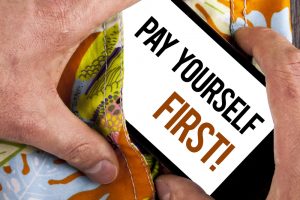 It is often stated that you can either work for money or you can make money work for you. In reality, it isn’t that black and white as most of us are not trust fund heirs, so we have to learn how to build up capital while working as employees in order to have funds to invest. When you invest, that is when you make money work for you, but you will never get there if you don’t learn how to invest in yourself by paying yourself first. It is a fundamental concept that most people don’t get, and it’s one that makes all the difference in the world.
It is often stated that you can either work for money or you can make money work for you. In reality, it isn’t that black and white as most of us are not trust fund heirs, so we have to learn how to build up capital while working as employees in order to have funds to invest. When you invest, that is when you make money work for you, but you will never get there if you don’t learn how to invest in yourself by paying yourself first. It is a fundamental concept that most people don’t get, and it’s one that makes all the difference in the world.
When you work, you create money or wealth through your labor – usually for another party, such as a private company or the state. You are shown appreciation for this effort and “rewarded” with your monthly salary or weekly wage. It is what happens next, in the first few hours and days after being paid your salary or wages, that is so important.
If you’re like most people, debit orders get deducted and you pay your living expenses – in other words, you pay your rent or mortgage, credit cards, medical bills and insurance. You buy groceries and pet food, refuel the car, and perhaps decide on a treat for yourself, such as a new haircut. You may have even give your child some extra pocket money.
The concept of paying yourself
There is one conspicuous omission. You have not paid someone very important: yourself! Does paying the mortgage and everything that involves paying for your needs count as paying yourself? No.
First, that is merely paying expenses. Second, you are not paying yourself – you’re paying the bank.
Paying yourself means putting money away for you – this is otherwise known as saving. Because you’re paying yourself, you have to take it seriously.
When you pay yourself is critical
Just as you pay everybody else, you have to pay yourself promptly. That means prioritizing yourself and paying yourself first, preferably into another account so you’re not tempted to use it. Just as there are strategies for trading the market that have rules, this is a rule for the strategy of paying yourself.
The timing of your payment to yourself is critical. You’ve done the month’s work, so you should get paid immediately, not last on the list after you’ve bought groceries. Paying yourself is sensible as it forces you to live off of what’s left over. Once you’ve forked out for everything else, including items you didn’t actually need but merely wanted, you become resentful of having to pay yourself. This is why studies have shown that in trial groups, people who paid themselves first ended up saving more in the long term.
If you’re not motivated, remind yourself that this is the first step toward making money work for you. You cannot get to this point if you don’t pay yourself first.
Starting to invest sooner with less is better than investing later with more
It is a myth that you have to wait until you have a large sum of money to begin investing, not least because it ignores the power of compound interest. Far from being simply untrue, investing in small amounts starting earlier can even have advantages in some contexts. This can be explained by way of example.
Let’s say you and a friend both have a sum of money to invest in stocks. Your friend really likes a certain company, so he takes all his capital and buys up as many shares in this company as he can all at once. He therefore pays the same price for all the shares.
You like the company too, but you want to diversify your portfolio. In addition to buying a few shares in the company, you also buy other stocks. This means buying fewer shares in the one particular company you both like upfront and then buying up a few more each month. Because you do so, the stock price of this company is sometimes higher, but a lot of times, it is lower. Over the long run, you have ended up buying shares at a much cheaper price than your friend. Statistics have proven this to be true.
Remember to invest in yourself by paying yourself first so you can make money work for you. There is also no better investment in yourself than education. Learn the ins and out of forex trading, commodities trading, options and learn how to trade CFDs. The more you know, the better position you’ll be in for smart wealth growth.